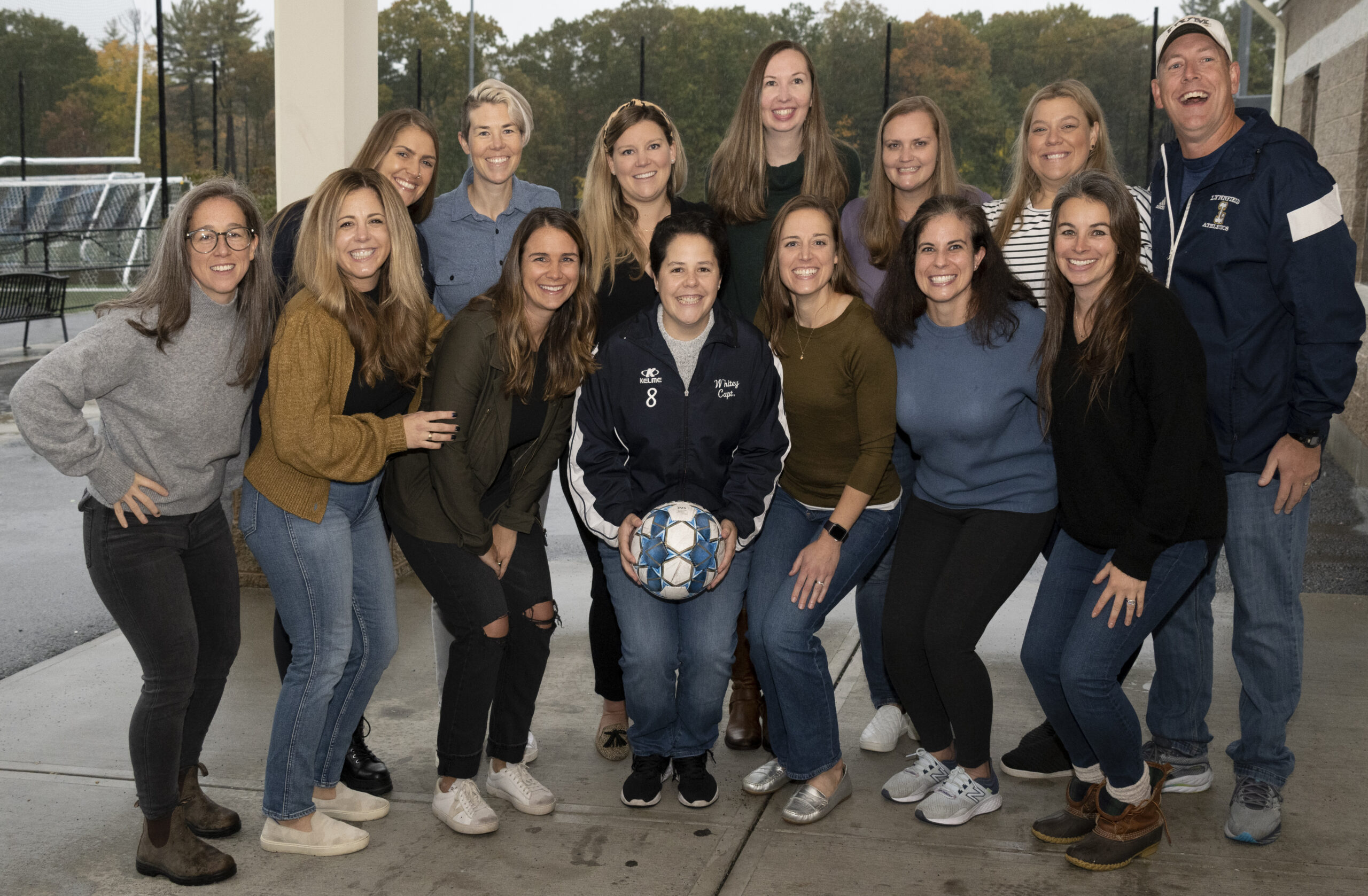Anybody who has ever donned their high school’s colors knows what it means to be a part of a team – the dedication, the collaboration, and the hard work needed to find that winning formula.
But it goes beyond winning. Just ask the members of the 2003 Lynnfield girls soccer team, which, this year, is celebrating the 20th anniversary of the program’s first state championship.
The title game itself – a Division III, 2-0 win over Douglas at Worcester State College on a cold November night – was the culmination of years of preparation. Most of the players had come up through the town’s youth soccer program, playing together since they were little.
Some sensed the 2003 season was going to be special. Vermont’s acronym for the season was M.I.S.S.I.O.N., which stood for Motivation, Intensity, Spirit, Sacrifice, Intelligence, Over the top, and Never quit.
The Pioneers started the season with a win at Hamilton-Wenham. The bus ride home was upbeat, with plenty of giddy girls celebrating the win.
At the front of the bus sat head coach Mark Vermont and his assistant Amanda Vance, the latter of whom dared to speak the unthinkable.
Gary Trask, the sports editor at The Peabody & Lynnfield Weekly News, covered the game. He recalled Vance saying, “Mark, this is the year we are going to win a state title.”
While Vermont downplayed the comment, he agreed the team could “go far.”
And it did.
Two decades later, most players have no clear memory of the game other than it was cold and the crowd noise was deafening. Many have married, started families, and careers. Most have forgotten who scored the goals. For the record, it was Alex White Gillies and Sara Hourihan.
While specific game details may have faded, the players have not forgotten how the experience helped define their adult lives.
Goalkeeper Jackie Bourque Tewksbury played at Bentley University. She remembers “running down the clock by playing keep away in the corner and really irritating the other team.” A UX researcher at FinTech, she said sports played a “critical part” in who she is and the success she’s had. “I loved playing soccer and the life-long friendships I have because of it.”
Julie Brown played at Bates College. She now works on the Wolverine Worldwide Consumer Insights Team, a company that makes athletic apparel and footwear.
Her biggest takeaway from her time playing has been how “to lead with empathy, to always stay curious, and never underestimate the power of your community and team.”
White played at Fairleigh-Dickinson. A special education teacher in Lynn, she admitted she was not the “easiest teammate.”
“I demanded a lot from myself and my teammates,” she said. “In my post-LHS life, I try to show more empathy. That definitely helps me now with my students and raising my daughter.”
Jessica Dolbeare played at Union College. An IT specialist at Alabama-based Boone News Media, she remembers “having an overall feel that we got this.” The biggest lesson she learned was the importance of being a good teammate.
“We didn’t compete against each other; we competed as a team together,” she said. “Now, as a parent and coach to my daughter’s travel team, I find myself incorporating so much of the team bonding and soccer drills in hopes of creating the same environment for them.”
Katie O’Brien Hayes played at Trinity College. The dean of students at New England Academy in Beverly never washed her socks during the tournament.
“They smelled bad, but were lucky,” she said.
She remembers how close everyone on the team was.
“We worked hard and played hard and committed to the team and held each other accountable,” she said. “If you were out past curfew at the local party, we were going to find out.”
Ashley Goldthwait Vangel graduated from Tufts. A physician’s assistant, her fondest memories were off the field.
“Between practices, pasta parties, and general shenanigans, we had a lot of fun together,” she said. “Coach Vermont was a master at cultivating team spirit. Hard work was only a part of it.”
Meghan Neary is a registered nurse. Being a member of the team “established my greatest friendships to this day,” she said.
She also loved that the boys’ team had nothing but “pure jealousy.” She said her team engaged in mini-games with the “losers” having to suffer “whatever lovely extra fitness punishment coach chose.” She said the team was so close that the “winners” always elected to run alongside the “losers.”
“I don’t think we knew it then, but it was those little competitions that pushed (us) to work as a whole,” she said.
Kristen Anderson Faivre played at Merrimack College and worked as a senior associate director of Annual Giving, Marketing, Stewardship, and Operations at Phillips Academy Andover.
“My fondest memory was when I found out that my younger brother was dating a teammate, Ashley Crawford,” she said. “They ended up being high school sweethearts and have been married for seven years.”
Crawford Anderson, a project manager at PwC and Bryant University grad, coaches her son’s Lynnfield youth team. She enjoyed “just hanging out. Many of us are still great friends, in each other’s weddings, and raising our families together.”
One of the most special stories is from Emily Solomon. A University of Tampa grad, she works as an alcohol and addiction treatment counselor.
“I struggled a lot in high school and did well in classes, but had dark thoughts,” Solomon said. “Some days, I dreaded going to school. Soccer after school was an escape for me. It was my saving grace.”
Everyone remembers the welcoming reception from the community.
“We had a police escort once we hit Lynnfield; we felt like royalty,” Courtney Kennedy Willard said, a URI graduate working at Thermo Fisher Scientific.
The most valuable lesson she learned is that “teamwork makes the dream work.” She still wears her old sweatpants, embroidered with the phrase, “We bust ours to kick yours.”
Elizabeth LeBlanc Wilfong, a St. Mary’s College of Maryland graduate said, “Coach told us to ‘wake this sleepy town up.’ We didn’t want the day to end, so everyone slept over at the Bourques. We went to school the next day, and I don’t think anyone stopped at home to shower first,” Wilfong said.
One year later, some of the younger players had a deja vu moment when the team won another title, sharing it with Sutton after the game ended in a 1-1 tie. At a late October mini-reunion of the 2003 team at the high school, many members of the 2004 championship team expressed their regrets that they didn’t get the chance to win it outright.
And while the old grass field they played and practiced on has transformed into the turf complex, some things, nonetheless, remain the same. Vermont, a teacher at the middle school, attempted – unsuccessfully – to organize the girls for a group photo.
“Why am I surprised they aren’t listening to me?” Vermont said. “They didn’t listen to me 20 years ago, and they still don’t.”

